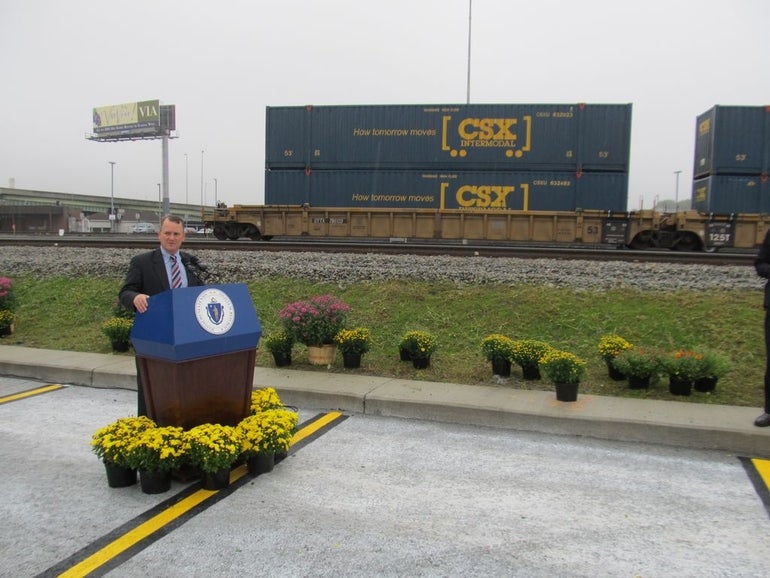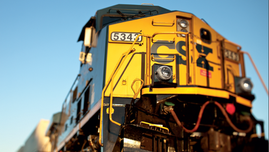Editorial: Biggest Benefit Of CSX Deal Is Freight Transportation
 Rick Saia
Lt. Gov. Timothy P. Murray lauds the agreement between the state and CSX Corp. this morning that will relocate CSX operations from Boston to Worcester and Westborough, while expanding commuter rail service between Boston and Worcester.
Rick Saia
Lt. Gov. Timothy P. Murray lauds the agreement between the state and CSX Corp. this morning that will relocate CSX operations from Boston to Worcester and Westborough, while expanding commuter rail service between Boston and Worcester.
The commonwealth has now assumed ownership of the 45 miles of CSX Corp. rail track between Boston and Worcester, opening the door to the expanded commuter rail service between the two cities that was long promised by Lt. Gov. Timothy Murray. In the 18 years since the MBTA expanded the Framingham rail line west to Worcester, the city has embarked on a downtown revitalization that could make that expansion pay off should Union Station experience a noticeable increase in the number of rail passengers.
What may be the overlooked part in this deal between the state and CSX is the shift of the freight carrier's intermodal operations from the Allston section of Boston to Worcester, more than doubling the size of CSX operations in the city to 51 acres. It's a solid move for Worcester in that it will usher in 85 permanent jobs, Murray's office said, and it cements the Worcester area's position as a freight transportation hub for all of New England. That's significant for interstate commerce because, according to Murray, 38 percent of all freight traffic in the United States goes through Massachusetts.
The Worcester yard — located between Franklin and Shrewsbury streets — currently processes about 110,000 intermodal containers annually, according to Murray, a number he expects will grow to 150,000 in the short term, and upwards of 200,000 over the long run.
It's not difficult to see this advantage with the confluence of state and interstate highways that can help move goods to and from several economic centers in New England in less than two hours. Over the last 15 years, the region's transportation infrastructure has been improved with the addition of a Massachusetts Turnpike exit at its junction with routes 20 and 146, as well as the widening of Route 146 and its connection with Interstate 290. While these created more convenience for consumers, the additional payoff to those investments has been the ability to leverage the region's central location in New England.
Business interests from within and outside the city have been either waiting or preparing for the CSX expansion. For example, Mike Testa, a member of a task force looking at increased economic development along Worcester's Route 20 corridor, and a board member of the Grafton Hill Business Association in the city, told us earlier this year about the CSX impact, "We'll have a lot more interstate traffic and some commercial (businesses) coming in."
And the Grafton & Upton Railroad, which carries freight southeast of the city, has been renovating its 15-mile-long track from Grafton to Milford, which will improve the movement of goods onto Interstate 495. In August, it signed a contract with a major shipper of bulk goods that officials see as a boost for jobs and new economic activity around the railroad's yard in Hopedale.
While increased use of the Boston-to-Worcester commuter rail line is welcome for both commuters and business, along with the environmental payoff of fewer cars on the roads, the big added value of the state's deal with CSX for Central Massachusetts lies in freight transportation. The addition of jobs and economic activity would be more than welcome. n
Read more
Officials Break Ground On Grafton & Upton Rail Project
Briefing: CSX And Commuter Rail
State Closes CSX Deal, Expands 'T' Service
$8M Plan Addresses Framingham Traffic, Rail
Election Winners Must Reduce Uncertainty For Small Businesses
Central Mass. Has Important Stakes In U.S. Fiscal Policy













0 Comments